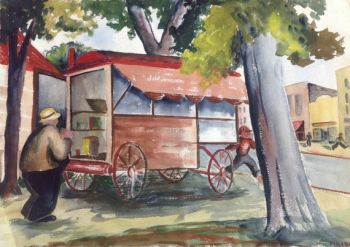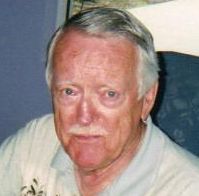
Publisher:
Bonnie King
CONTACT:
Newsroom@Salem-news.com
Advertising:
Adsales@Salem-news.com

~Truth~
~Justice~
~Peace~
TJP
Apr-23-2013 01:33

 TweetFollow @OregonNews
TweetFollow @OregonNews
Sometimes, A Great Town
Bill Annett Salem-News.comHuman nature cannot be studied in cities except at a disadvantage--a village is the place. There you can know your man inside and out--in a city you but know his crust; and his crust is usually a lie. - Mark Twain
 Courtesy: etsy.com |
(DAYTONA BEACH, FL) - Sleepy Slater had a store-front shop on Main Street, which included a fortunate sort of bay window, at which he sat crouched over his shoemaker's workbench. Through the bay window, he commanded a view of the far reaches of our town's principal thoroughfare, and could note the approach of any customer – and we were all, all 300 of us, Sleepy's captive clientele, because there wasn't another shoemaker for 50 miles in any direction from my home town in the Thirties. In those days - unlike the present - you could buy a half-sole (or perhaps a half-soul) cheaper than a new pair of shoes.
Behind Sleepy's vantage point in the bay window there loomed a veritable mountain or at least a heap of shoes, male, female, children's, adults', in various stages of disrepair, and awaiting his attention. At the approach of any current customer from either direction on Main Street, Sleepy would leap into action, burrow into the pile of shoes and with uncanny and unfailing accuracy come up with the approaching customer's shoes and be busily engaged in their repair when the customer entered the door. Otherwise, the subject shoes might languish in the pile indefinitely.
Was Sleepy typical; was Consort really just a somnolent little town in the depths of the long Depression? It makes good anecdotal copy, the kind you get misty over in the Reader's Digest, but to end there is far from the story of my home town. It was a town with guts, and courage, it was a town that endured because of the caliber of its people. They first arrived about 1912, resolute pioneers like Charlie Fawcett, the Goulds, the Campbells, who centered on it as they planted crops and ran cattle, who predated the CPR branch line that became the town's main artery.
I think of Bill Wiese as a better icon than Sleepy Slater. Bill, make no mistake, was primarily an avid student of not exerting himself unnecessarily, the sort of guy who would have been known seven decades later as “cool.” He expressed that philosophy vehemently on subjects such as the town's annual bonspiel, which he endorsed as a time when the entire town could chill out and stop worrying about work, money or civic problems. And God knows there were always either too much or too little of those, of all three, in our town. Typically, in the bleak Thirties, the name of the game in our town featured no work, little money and a host of problems.
As for Bill's exerting himself unnecessarily, even in his 40's he possessed and demonstrated with startling regularity an incredible pitching arm that in another world and time I haven't the slightest doubt would have taken him to the majors. On one unforgettable “Sports Day,” in a tournament with neighoring towns' baseball teams, (unlike today's million-dollar six-inning starters, three-inning relievers or one-inning closers) Bill Wiese pitched three nine-inning games in a single day. And won them all.
That was no big deal to us. We were used to second effort. Deep in World War II, with the local baseball team desperately short-handed, with so many guys in the service, I remember an occasion when they sent a delegation to get Orem Webb, a middle-aged rancher, out of the beer parlor to face a pinch-hit situation. They suited him up, propped him up, (he batted, as I recall, left-handed) and he powdered the first pitch. The baseball ascended like a Cape Canaverel contrail over the race track beyond first base. Not only did they never find that home run ball, Orem was useless for the rest of the game. Years later in Yankee Stadium, I saw an antiquated Frankie Crossetti do the same thing in an exhibition game, in fact collapsing with a Charley horse half way to first, but I found it less impressive than Orem's brief performance, before he returned to the beer parlor.
But Orem Webb's homer isn't the real point, nor is the single facet of Bill Wiese's story. While they both displayed the cool under pressure Hemingway called courage, seemingly without extra exertion, that didn't sum them up. Bill, for example, was one of the town's most successful entrepreneurs, developing from scratch an independent electric power plant, to provide electric service to our town, and decades later selling it to the giant Calgary Power.
My town, tiny by any worldly standards, produced doctors, lawyers, engineers, politicians and a Rhodes Scholar. It gave the world k.d. lang and Nickleback, the world class rock group. In fact Art Kroeger, the Rhodes Scholar, was the great uncle of the two guys that started Nickleback, predictably in a garage. Nick's garage. They were Nick Kroeger's grandsons, and Nick ran the local garage.
In World War II, Gene Sodeman, the son of the local butcher, was awarded the Military Medal, Canada's most distinguished decoration for bravery next to the Victoria Cross. Guys like Snuffy Day and Sam Spencer and Alex Sterrenberg came home from the RCAF with the DFC. Tom Carolan, who farmed west of town, had three sons. He lost all three in the War: Bus when the destroyer H.M.C.S. Fraser was sunk early in the Bay of Biscay, Johnny in the Army in Europe after D-Day, and Huck in a Lancaster over Germany.
I left town almost 70 years ago, and I can only note from a distance that it has become a much different, much better town since that time, in the ways in which people usually keep score. When I was in my teens, we played hockey in 30-below weather on an open-air rink, the hoar frost making it impossible to tell blue jerseys from red. And, after the ice went out about March every year, we held an annual broom ball game that lasted all day, a marathon cataclysmic contest. It pitted the West Side of Main Street against the East Side, with dozens of participants simultaneously, men, women, kids and dogs. It was more lethal and life-threatening than a chukka of polo or lacrosse played by Indian braves.
Today they have a sports complex. Unlike the pickup shinny we played, today's kids are organized from kindergarten age to upper teens, and they routinely win things like provincial championships. (Despite our poor effort, Bobby Turton, one of our guys, who never had a chance or a break in our meager world, segued into a criminal life that ended by getting him killed, but was probably the best hockey player I've ever seen. And I've seen them all, from Boom-Boom Geoffrion to the Sedins, over a long lifetime. I think I've seen Ovechkin deke a goalie left-handed, do a quick shift and score shooting right-handed. Bobby did that routinely 75 years earlier.
Back then, Doc Day ran a one-man healthcare system in a three story house two blocks north on Main Street. Today the town has a modern hospital, nurses, doctors, high technology. For all I know they even bill people. Doc never did that, in 50 years of practice.
As kids we played kick-the-can, dare-base, and on Saturday night we were entertained by the occasional dog fight on Main Street, or we watched haircuts. Today's town isn't that much bigger, but it has a library, a drama group, a fire department and a community airport.
But I like to think of it as it was - a town that lived through the Depression, seven consecutive years of crop failure and was, like Tom Brokaw's generation, “tempered by war and a hard and bitter peace.” It has survived the exigencies of the post-America, globalized world, and yet retained those qualities I remember as a kid, the endurance, the forward looking, the cool. Not just the world of Sleepy Slater, but more emphatically, in the spirit of Bill Wiese.
I was raised on that famous kid's story, “The Little Engine That Could, ” which my parents read to me incessantly as far back as I can remember. That's the appellation I like to attach to my home town: “The Little Town That Could."
Sometimes, a great town.

Bill Annett grew up a writing brat; his father, Ross Annett, at a time when Scott Fitzgerald and P.G. Wodehouse were regular contributors, wrote the longest series of short stories in the Saturday Evening Post's history, with the sole exception of the unsinkable Tugboat Annie.
At 18, Bill's first short story was included in the anthology “Canadian Short Stories.” Alarmed, his father enrolled Bill in law school in Manitoba to ensure his going straight. For a time, it worked, although Bill did an arabesque into an English major, followed, logically, by corporation finance, investment banking and business administration at NYU and the Wharton School. He added G.I. education in the Army's CID at Fort Dix, New Jersey during the Korean altercation.
He also contributed to The American Banker and Venture in New York, INC. in Boston, the International Mining Journal in London, Hong Kong Business, Financial Times and Financial Post in Toronto.
Bill has written six books, including a page-turner on mutual funds, a send-up on the securities industry, three corporate histories and a novel, the latter no doubt inspired by his current occupation in Daytona Beach as a law-abiding beach comber.
You can write to Bill Annett at this address: bilko23@gmail.com
 |
 |
 |
Articles for April 22, 2013 | Articles for April 23, 2013 | Articles for April 24, 2013

googlec507860f6901db00.html
Salem-News.com:



Terms of Service | Privacy Policy
All comments and messages are approved by people and self promotional links or unacceptable comments are denied.
[Return to Top]
©2025 Salem-News.com. All opinions expressed in this article are those of the author and do not necessarily reflect those of Salem-News.com.